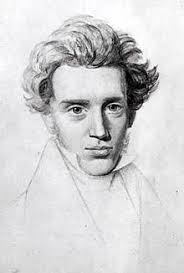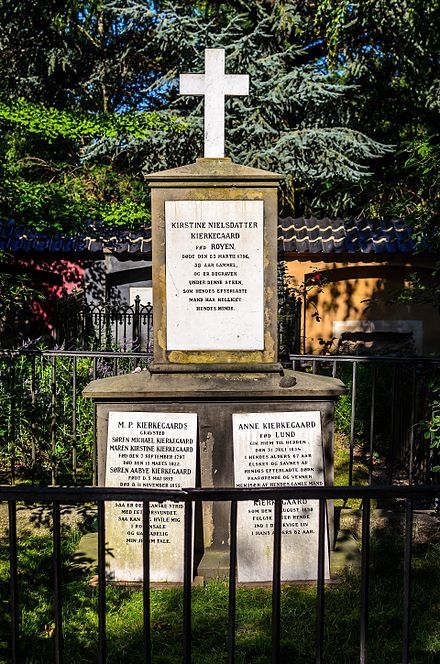243. Eros and Thanatos, Part 7: Kierkegaard’s Idea
Soren Kierkegaard
In previous posts we have seen ways in which Eros (love) can imply, lead to, or be thwarted by Thanatos (death). Here is yet another example of a dynamic relation between the two that utilizes some ideas from the Danish philosopher and father of existentialism Soren Kierkegaard (1813-1855).
When he was young Kierkegaard wrote this sentence in his journal: “I have just returned from a party of which I was the life and soul; wit poured from my lips, everyone laughed and admired me—but I went away—and the dash should be as long as the earth’s orbit———————and wanted to shoot myself.” Here we see Kierkegaard experiencing being one way on the outside and a radically different way on the inside; the experience, we can say, of being inauthentic. And we see that this experience gave rise to what we now call, in large part due to Kierkegaard, an existential crisis. I think his philosophy should be seen as a response to this crisis and it revolves around an important, in some ways the most important, question for us all: how can we become authentic, integrated individuals?
Kierkegaard’s answer to this difficult question is clear: find an idea for which we can live and die. Such an idea would bring integration since, rather than being something held intellectually with no connection to action, it would be adopted with passion and become inseparable from one’s identity and conduct. Indeed, being asked to drop it would be like being asked to die. So for Kierkegaard how much we love something is directly proportional to how readily we will die for it: love and death are connected in a very literal way.
But what kind of idea should we have? Not surprisingly Kierkegaard, a devout Christian, claims we should have an idea of God: “But the self is intensified in proportion to the standard by which the self measures itself, and infinitely so when God is the standard. The more conception of God, the more self; the more self, the more conception of God.” This criterion, because it is an eternal, perfectly good, and infinite one, radically changes how we see ourselves and opens up the opportunity to be authentic individuals. Douglas Steere, in his translator’s introduction to Kierkegaard’s book Purity of Heart Is to Will One Thing (HarperOne, 1956), offers a helpful explanation: “This isolation of man from the flock, from the mass, from the crowd and the heightening of his consciousness as an individual which the Eternal accomplishes is a central theme of Purity of Heart Is to Will One Thing. Before the quiet gaze of the Eternal, there is no hiding-place. As individuals we are what we are before God, and no mass opinion affects this in the least. Kierkegaard believed that his generation was seeking to live in mere time and to make the Eternal superfluous. He reminded them of the Eternal’s power to dissolve away time and to separate the crowd into individuals. In memory, in conscience, in remorse, in work at a calling, in the solitude, the Eternal still impinges upon the individual and awakens him to a consciousness both of himself and of his responsibility and of his worth to the Eternal.”
But this is not to say that before God we become self-reliant individuals. It is just the opposite: we realize we cannot make ourselves integrated regardless of our understanding and technology. In short, we realize that we rely on God’s grace for guidance and must have faith. Kierkegaard explores this faith in his book Fear and Trembling which looks at the biblical story of Abraham and his willingness to suspend the norms of society and sacrifice his son Issac for God. The gravity of this ancient tale dramatically underscores that the commitment to God can require tremendous sacrifice and even death. Abraham’s acceptance of this requirement reveals that his idea of God was completely integrated with his conduct: he is an authentic “knight of faith.”
In his book For Self-Examination (Princeton, 1990) Kierkegaard shows how faith leads to psychological death as well since “Faith is against understanding; faith is on the other side of death. And when you died or died to yourself, to the world, then you also died to all immediacy in yourself, also to your understanding. It is when all confidence in yourself or in human support, and also in God in an immediate way, is extinct, when every probability is extinct, when it is dark as on a dark night—it is indeed death we are describing—then comes the life-giving Spirit and brings faith” (81). But this death, this relinquishing of understanding, self-reliance, and self-importance, offers hope for life after death and makes true love possible by replacing self-interested, conditional love with altruistic, unconditional love for our neighbors.
In chapter nine of his book Works of Love (Harper Torchbooks, 1964)—“The Work of Love in Remembering One Dead”—Kierkegaard claims we can test our love by remembering the dead which is “the most unselfish love,” “the freest love,” and “the most faithful love.” This is because the love which the living person bestows on the dead cannot be returned. Therefore loving the dead gives one an opportunity to see if one is loving unconditionally: “If an alteration enters into this relationship, I must be the one who changes. Therefore, if you will test whether or not you love faithfully, note some time how you relate yourself to the one dead.” If we pass the test we’ll find we can learn much from the dead such as “the kindness in thought, the definiteness in expression, the strength of unchangeableness, the pride in life which you would not be able to learn as well from any human being, even the most highly gifted.”
So we see that being willing to die for an idea is a sign we love it and are passionate about it; and this passion leads to action which overcomes any disintegration between the idea and the conduct that flows from it. This is the way to authentic individuality. However, we must have the right idea and for Kierkegaard this idea should be of infinite God who helps us see our faults and delusions in a way no finite criterion could possibly achieve. This may, as in the case of Abraham, require us to face trying ordeals with the prospect of actual death of some kind. And it will certainly require the psychological death of one’s understanding and autonomy as the means to self-integration. The illusion of control must be relinquished. But out of this death we can be reborn with the revitalizing gifts of faith, hope, and especially an altruistic form of unconditional love for our neighbor which can be tested by remembering the dead.
For the other posts on eros and thanatos in this series, go here.
For my other posts on Kierkegaard, go here.

